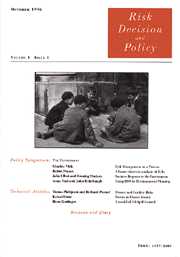No CrossRef data available.
Article contents
Citizens' juries: discussion, deliberation and rationality
Published online by Cambridge University Press: 24 August 2001
Abstract
There is now a relatively well-developed critique of the application of cost-benefit analysis (CBA) to environmental problems. Theories of deliberative democracy have been invoked which question the individualistic, preference-based calculus of CBA. While the critique of CBA is well developed, the positive accounts of the virtues of deliberation appear relatively sketchy. This is a very large task, but the paper argues one important aspect of it can be captured by the following question: What are the relative merits of public deliberation about the environment, vis-a-vis private reporting of individual judgements? The paper addresses this question by seeking to analyse in detail the virtues of discussion in one widely debated deliberative institution, the citizens' jury. Throughout, the paper draws on the experience of a citizens' jury on an environmental problem: a jury on wetland restoration in East Anglia, UK, co-organized by the author.
- Type
- Technical Article
- Information
- Copyright
- © Cambridge University Press, 2001


